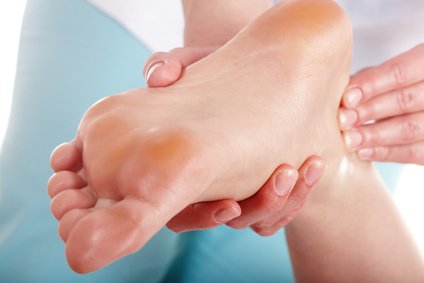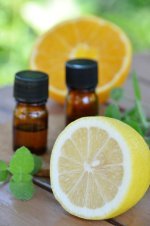Essential Oil Safety
Essential Oil Safety is a Matter of Common Sense
Essential oils are safe to use for you and your family. Essential Oil Safety is just a matter of common sense and being mindful of their power and potency. Our family has safely used them for years.
Essential oils are highly concentrated, powerful and highly potent. Only small amounts are required (just a few drops) in their application, less is truly more. This may be difficult to believe at first.
We are conditioned to believe that more is better... but trust us, less is truly more. With time, experience, and observation, you will learn this too.
Common sense must be used, even with the safest and gentlest essential oils as they are potent and powerful.
Consult your health care professional about any serious disease. Do not try to diagnose or prescribe essential oils for serious health conditions that require professional medical care.
Keep Out of Reach of Children

Children, with their innate curiosity, are especially at risk. It is highly important that you create good habits around essential oil safety.
Please close all bottles tightly and store in a place that is out of reach for them.
In Case of Emergency
Accidental Ingestion (drinking or swallowing)
1. If an infant or child should accidentally swallow essential oils, immediately dilute the ingested oil by administering milk, soy milk, rice milk, yogurt, cream, or honey. Only use honey if the child is over 12 months of age.
2. Call your poison control center and/or seek emergency medical help.
Eyes
1. If essential oils get into the eye, dilute the area immediately with vegetable (olive, coconut, etc.) or carrier oil. Do this by placing the vegetable oil on a tissue and gently wiping the eye area. Repeat as necessary.
Skin
1. If the skin should become
irritated, or if there is a burning sensation, dilute the area immediately with vegetable or carrier oil. You can rub vegetable or carrier oil directly on the area and wipe off with a tissue. Repeat as necessary.
Do Not Use Water
Do not use water!
It can increase irritation by spreading the oils.
It may also cause the oil to penetrate more quickly. You may need to wipe the essential oil off with pure vegetable or carrier oil several times. If this does not provide relief, contact a health care professional, and discontinue use of the oil.
Important Essential Oil Safety Guidelines
1. Keep carrier oil or pure vegetable oil close by, when using essential oils, to wipe off if needed.
2. To remove essential oil: Apply the pure vegetable or carrier oil to a cotton ball, tissue, or handkerchief and gently wipe to dilute and remove the oil.
3. Keep essential oils away from the eyes and the eye area.
4. Do not rub your eyes or handle contact lenses with essential oils on your fingers.
5. Do not put essential oils into the ear canal. You can rub oils around the ear, just inside the outer ear, and behind the ears.
6. Do not apply essential oils on the mucous membranes unless diluted.
The most common Essential Oil Safety Mistake
In our family, the most common problem has been accidentally touching or rubbing our eyes when we still had oil on our fingers. If this should happen, immediately remove the oil by gently dabbing your eye with a cotton ball or tissue that has vegetable or carrier oil on it. This will help dilute the oil.
Oils can burn and sting (just like getting onion or garlic juice in your eye), but they will not damage the eye.
Do not flush the eyes with water! Water spreads the oil and could make it worse. Oils are not water soluble.
Skin Testing

One of the most important rules for essential oil safety is to always test an essential oil on the skin before use. Each person has their own unique body chemistry and just as foods affect people differently, so do oils.
Testing the oil on the soles of the feet is the safest place. Always test here for babies and children and for those with allergies.
Another location is on the inside of the arm just above the elbow. 10-15 minutes is usually sufficient. If the person you are testing is prone to allergies or unusually sensitive allow for 30 minutes. Testing allows you to see how their body will respond.
Always, ask about skin and respiratory sensitivity.
Important Essential Oil Safety Guidelines
1. Always have vegetable oil or carrier oil close by when applying essential oils. This is to dilute and remove the oil if necessary. Do not try and dilute the essential oils with water, it will spread the oil and could make it worse.
2. Do a skin test of the essential oil if you are using it on a person for the first time. The soles of the feet are the safest and one of the most effective places to use and test oils, especially for babies, children and those with respiratory sensitivity. On the inside of the arm, above the elbow, is another testing place.
3. Always ask if they have respiratory sensitivities. These people need to be extra cautious when using essential oils.
4. Certain oils should always be diluted. They can burn and irritate the skin if not diluted. We call them the "Hot" oils. Essential oils high in phenols, citrals and cinnamic aldehyde, such as thyme, oregano, clove and savory (phenols), lemongrass (citrols), cinnamon bark and leaf (cinnamic aldehyde).
5. Always use a dispersing agent, such as bath gel base, Epsom salts, or baking soda when adding essential oils to bath water. Never add undiluted essential oils to bath water as they can injure or burn the skin.
6. Do not apply undiluted or "neat" essential oils to parts of the body that are hot, dry or tender. Instead, use a compress that has been soaked in cold water filled with dispersed essential oils.
7. Use only therapeutic grade essential oils and oil blends. This is extremely important regarding essential oil safety.
Internal Use
8. Before ingesting essential oil, or applying it to your skin, know and trust your source. Most oils on the market contain chemicals that may be dangerous and toxic. They are not therapeutic. We recommend Young Living Therapeutic Grade Essential Oils because of their purity and quality.
9. Before taking GRAS (generally regarded as safe) essential oils internally, always dilute in a capsule filled with vegetable oil or mix it with a teaspoon of honey, agave, or olive oil. You can also mix a drop in with rice, soy or almond milk.
10. Always double check to make sure the essential oil is certified as "GRAS" (generally regarded as safe), or FA (approved food additive), or FL (flavoring agent) by the FDA.
Potentially Flammable
11. Some essential oils are potentially flammable, including pine, fir, orange and peppermint. Keep away from open flames, and electricity.
Citrus Oils
Some essential oils from citrus might make the skin very sensitive to the sun’s rays as they are light sensitizing. This includes the concentrated, artificial rays from tanning beds which pose a much higher risk.
Avoid direct sunlight for 24-48 hours and tanning beds at least 3-4 days before using citrus essential oils to avoid rash and dark pigmentation.
Single oils and blends that contain citrus essential oils: lemon, orange,
tangerine, grapefruit, bergamot, white angelica, citrus fresh, and joy.
Special essential oil safety guidelines
- For babies and children
- pregnant/nursing women
- sensitive respiratory system
- Use these oils only if your blood pressure is within normal range
Not all oils are recommended for these ages and conditions.
Essential Oil Safety for Babies and Children

It is highly important to keep essential oils out of the reach of children. Close each bottle tightly after each use. Double check the bottles before putting away.
If a child or infant should accidentally swallow some essential oil:
1. Immediately have them drink an oil soluble liquid such as milk, soy milk, rice milk, almond milk, coconut milk, cream or yogurt.
Honey can be used if the child is over the age of 12 months. Call your poison control center and/or seek immediate medical emergency help.
2. Do not use peppermint or any essential oil that is rich in menthol on or near the throat and chest area of babies and children that are younger than 2 1/2 years or 30 months of age. This could potentially cause laryngeal spasms.
3. Always check to see if the essential oil, or essential oil blend, is safe for use on infants and children.
When using stronger oils dilute them 1:4: One drop essential oil to 4 drops of carrier oil.
5.
The bottom of the feet is the safest and most effective place to test
and use essential oils on infants and children.
Essential Oil Safety for Respiratory Sensitivity
Many people with respiratory sensitivities safely use essential oils and find them highly beneficial. The key here is to test for sensitivity by starting on the soles of the feet.
1. Do a skin test of the essential oil if you are using it on a person for the first time.
The soles of the feet are the safest place to test, especially if the person has known sensitivities. Inside of arm above the elbow is another place.
2. Always
ask if they have respiratory sensitivities. They should be extra cautious
when using essential oils. Sensitivities can happen with oils just
as they do with food.
This does not mean that oils should not be used but to proceed slower and with greater caution. Test on the soles of the feet where there is less likely to be a reaction.
3. A person with respiratory sensitivity should not get right next to an essential oil diffuser to breathe in the oils. Maintain a safe but reasonable distance.
4. Do not apply oils topically to the nose, throat or chest area of a person with respiratory sensitivity. Use oils topically on the bottom of the feet, and diluted on back.
Slow,
cautious, exposure is recommended to see how well the oils are tolerated.
Essential Oil Safety for Pregnant or Nursing Women
Consult with a health care profession before using essential oils if you are pregnant or nursing. Be mindful of oils such as clary sage, sage, Idaho tansy, and fennel.
Essential Oil Safety: Use these oils only if your blood pressure is within normal range
Consult with a health care profession before using essential oils
1. Avoid sage, rosemary, hyssop, and fennel if your blood pressure is not within normal range.
Young Living Essential Oils are the oils we recommend because of their quality and purity.

